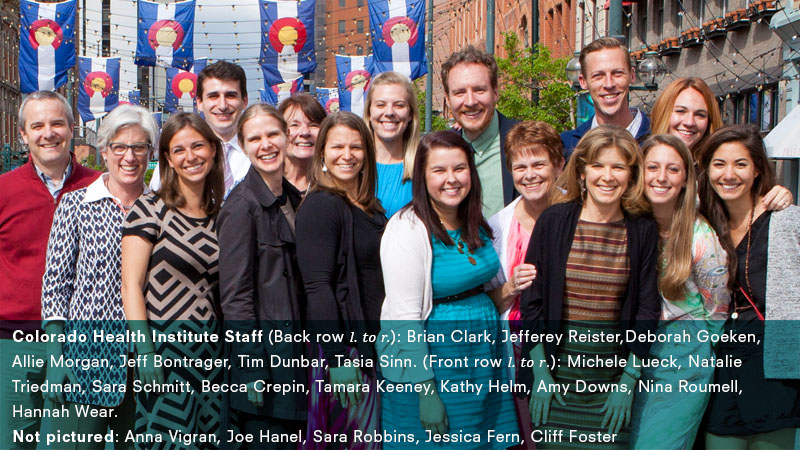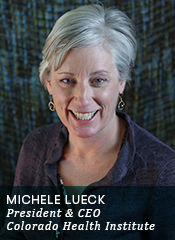Colorado Health Institute: Adding Analysis

Colorado Health Institute Staff (Back row l. to r.): Brian Clark, Jefferey Reister, Deborah Goeken, Allie Morgan, Jeff Bontrager, Tim Dunbar, Tasia Sinn. (Front row l. to r.): Michele Lueck, Natalie Triedman, Sara Schmitt, Becca Crepin, Tamara Keeney, Kathy Helm, Amy Downs, Nina Roumell, Hanna Wear.
Not pictured: Anna Vigran, Joe Hanel, Sara Robbins, Jessica Fern, Cliff Foster
 In 2002, AltaVista was still hoping to topple Google. Kids were obsessed with a new gadget called the iPod. And the Colorado Health Institute (CHI) was founded as a warehouse for health data that wasn’t available anywhere else.
In 2002, AltaVista was still hoping to topple Google. Kids were obsessed with a new gadget called the iPod. And the Colorado Health Institute (CHI) was founded as a warehouse for health data that wasn’t available anywhere else.
CHI has come a long way since then. The organization was established with funding from The Trust and two other foundations, Caring for Colorado Foundation and Rose Community Foundation, as a way to fill gaps in public data. It still fulfills that role, but goes far beyond it—one of several reasons The Trust extended its support of CHI in November 2014 with a new five-year general operating support grant.
“A lot of what’s needed now,” says CHI President and Chief Executive Michele Lueck, “is not only data but analysis.”
The nonprofit now works to identify trends and patterns in the reams of publicly available data, and to provide context that helps lawmakers, policy experts, academics, local public health officials and journalists make sense of splintered information. To that end, CHI answered a record 371 information requests in 2014—free of charge when less than four hours of staff work was required.
And in December, the organization’s annual two-day “Hot Issues in Health Care” conference—long a place for legislators to discuss policy priorities—was opened for one day to health policy experts, advocates and journalists.
Hundreds of attendees gathered for the event in Colorado Springs. They listened to keynote speaker Susan Urahn of The Pew Charitable Trusts describe state-level health care trends in a national context. Breakout panels discussed efforts to integrate physical and mental health care, and how public health efforts are looking beyond the doctor’s office to the way neighborhoods are built and how people live their daily lives.
Events like this conference, says Lueck, put evidence-based analysis at the table when policymakers are making decisions that affect all of us.
What’s next for the organization? “There’s a greater hunger for local data,” says Lueck. State- and county-level information may not go far enough to illustrate the particular ills of a small town or a neighborhood. “We have an opportunity to get to the granular level.”
Look for CHI not only to make that information available, but to explain why it matters, and to inform debates on how to advance solutions.